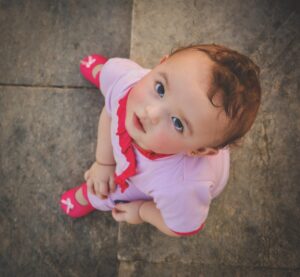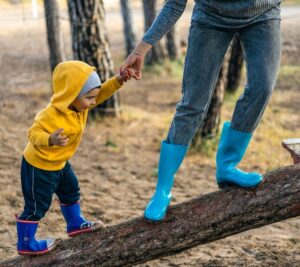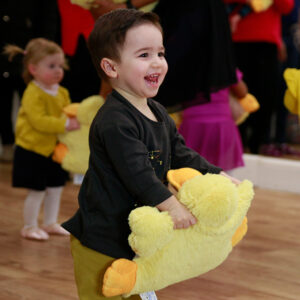The first three years of your child’s life are a truly extraordinary time, with intense cognitive development taking your child from a newborn, dependent on you for almost everything, to an increasingly independent individual who talks, walks, sings and more.
 This is when when children develop physically, cognitively and emotionally at a faster rate than any other time in their lives. The transformation over your baby’s first year is amazing – by their first birthday they’ll have become more mobile, developing their strength and balance as they move from sitting unsupported to standing and eventually to walking.
This is when when children develop physically, cognitively and emotionally at a faster rate than any other time in their lives. The transformation over your baby’s first year is amazing – by their first birthday they’ll have become more mobile, developing their strength and balance as they move from sitting unsupported to standing and eventually to walking.
Rhythm & repetition – again and again!
Sitting and standing means your baby is able to see what’s going on around them, and is keen to participate and learn more. They learn from you, and from other children, imitating gestures and words, and communicating all of the time. Repetition and music support this development, with children’s songs, rhymes and repetition a fantastic way to build on this early language development.
Dr Sarah Kuppen, Chartered Psychologist comments “The importance of rhythmic cues suggests that hearing rhythms, such as those in nursery rhymes, could support children’s language development.”
Research has shown that infants respond to the rhythm and tempo of music, and even find it more engaging than speech. A study of children aged from 5 months to 2 years showed that in fact babies may be born with a predisposition to move rhythmically in response to music.
The University of York researchers captured movements made by babies and toddlers in response to different sounds, from classical music, rhythmic beats and speech. Dr Marcel Zetner, from the university’s Department of Psychology, noted that “our research suggests it is the beat, rather than other features of the music, such as the melody, that produces the response in infants.”
The study also asked professional ballet dancers to analyse the babies’ and toddlers’ movements to understand the extent to which they matched the music played. It appears that the better the children were able to synchronise their movements with the music, the more they smiled – that’s what we call the joy of dance!
The first three years – keep on moving
As toddlers build their strength and stamina, they also continue develop their motor skills – the ability to control movement of muscles to perform a specific act. This is the time when most children will begin to walk, quickly followed by running and dancing! With a lot of energy to use, toddlers want to use their new-found mobility to explore and have fun.
 Much of this is learned through play and other activities, and by the time children are in their second year, they’ll be developing balance, rhythm and co-ordination. Children begin to build their own ways of moving, everything from wriggling, rolling and swaying through to hopping, bouncing, clapping and jumping. All regular activities for energetic toddlers in their super-charged development phase, and part of what feeds in to establishing early dance skills.
Much of this is learned through play and other activities, and by the time children are in their second year, they’ll be developing balance, rhythm and co-ordination. Children begin to build their own ways of moving, everything from wriggling, rolling and swaying through to hopping, bouncing, clapping and jumping. All regular activities for energetic toddlers in their super-charged development phase, and part of what feeds in to establishing early dance skills.
When thinking about any aspect of child development at this very early age, the important thing to consider is that everything must be fun – children learn best through play. This is not a time for hot-housing or intense skills practice!
Little kids love to be around others – we are social animals after all. Watching and listening to their adults and other children is essential, and the repetition of fun sounds, songs, stories and movement is a perennial part of childhood.
The power of imagination
 Our tiny dancers at DN Dance Babies classes love Della Duck and Ralphie Ram – two cute animal characters. Classes follow their adventures and use the power of imagination to tell stories, sing songs and move to music together. As professionals, we can see the children developing skills and techniques, but to these youngest members of the DN Dance family, they’re just having great fun.
Our tiny dancers at DN Dance Babies classes love Della Duck and Ralphie Ram – two cute animal characters. Classes follow their adventures and use the power of imagination to tell stories, sing songs and move to music together. As professionals, we can see the children developing skills and techniques, but to these youngest members of the DN Dance family, they’re just having great fun.
The content is created and delivered with care to suit each age and stage, and we’re always mindful of the fact that every child will develop at their own pace, reaching milestones in their own time.
Dance is a wonderful way to support your child’s development during these crucial early years, in a supportive, gentle and welcoming environment. Enrolments are open now across all three of our DN Dance Babies locations in Edinburgh – contact us for more information, or book online now directly via the website.
References:
Marcel Zentner, Tuomas Eerola. Rhythmic engagement with music in infancy. Proceedings of the National Academy of Sciences, 2010 (from sciencedaily.com)
Dr Sarah Kuppen, ‘Rhymes in Early Childhood”, booktrust.org.uk